Welcome to our coffee storage guide! As coffee enthusiasts, we understand the importance of preserving the freshness and flavor of this beloved beverage. One question that often arises is whether coffee should be kept in the refrigerator. In this article, we will explore the impact of environmental factors on coffee quality and provide expert tips on the best way to store coffee for maximum enjoyment.
When it comes to coffee storage, it’s crucial to consider factors such as oxygen, light, temperature, and moisture. These elements can all affect the taste and shelf life of your coffee beans or grounds. Let’s dive deeper into each of these factors to understand how they can impact coffee preservation.
Key Takeaways:
- Storing coffee in the refrigerator is not recommended due to its humid and light environment.
- Oxygen, light, high temperatures, and moisture can all impact the freshness of coffee.
- The best way to store coffee is in an airtight container in a cool, dark cupboard.
- Avoid sudden temperature fluctuations and exposure to light to protect coffee quality.
- Freezing coffee can extend its shelf life, but it may affect the original flavors.
The Impact of Oxygen on Coffee
When it comes to coffee preservation, oxygen is one of the main culprits that can negatively affect its freshness and flavor. Exposure to oxygen can lead to oxidation, causing the coffee to become stale and lose its aromatic qualities. That’s why you’ll often find freshly ground coffee packaged in airtight, vacuum-sealed bags.
To minimize the exposure of coffee to oxygen, it’s essential to store it properly. Keep your coffee sealed in its original packaging if it comes in a resealable bag. This packaging is designed to keep oxygen out and maintain the coffee’s freshness. If your coffee doesn’t have a resealable bag, it’s best to transfer it to an airtight container. This will provide an additional layer of protection against oxygen infiltration.
The importance of airtight containers
When choosing an airtight container for your coffee, look for one that has a secure lid or seal. This will prevent any air from entering and affecting the quality of your coffee. Glass jars with airtight lids or specially designed coffee canisters are great options for storing coffee. Remember to place the container in a cool, dark cupboard away from light and heat sources to further protect the coffee from degradation.
By taking steps to minimize the exposure of your coffee to oxygen, you can ensure that each cup is as fresh and flavorful as possible. So, seal it up and keep it airtight to preserve the rich tastes and enticing aromas that coffee lovers cherish.
The Effects of Light on Coffee
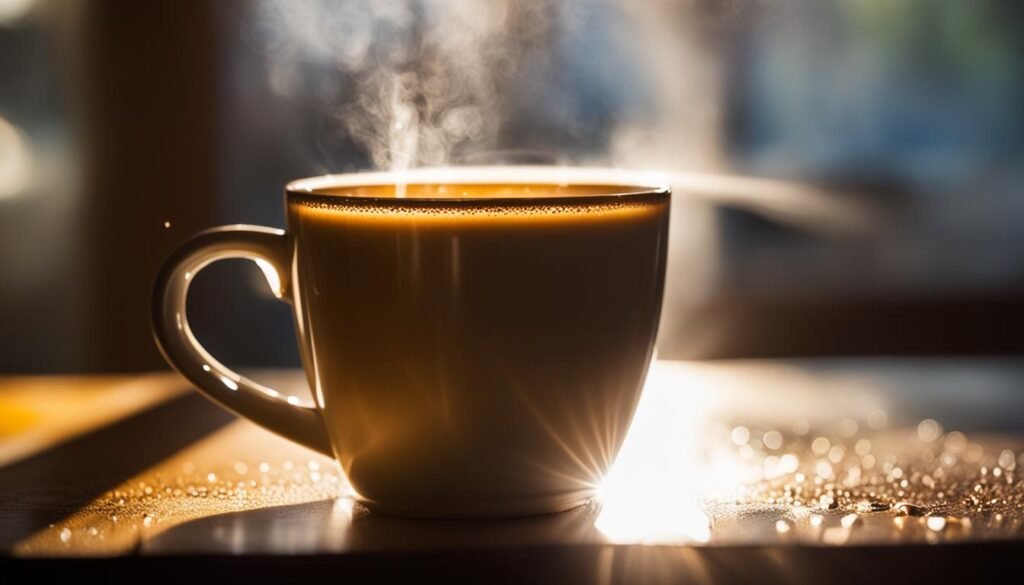
When it comes to preserving the freshness and flavor of your coffee, the impact of light cannot be overlooked. Whether it’s natural sunlight streaming through a window or the artificial light in your kitchen, exposure to light can have detrimental effects on coffee.
Light can break down the molecules in coffee, leading to oxidation and a loss of flavor. To protect your coffee from these harmful effects, it’s best to store it in opaque containers that block out any sources of light. This helps to maintain the integrity of the coffee and ensure it stays fresh for longer.
Additionally, it’s important to keep your coffee away from direct sunlight or bright artificial light. The UV rays in sunlight can accelerate the degradation process, causing your coffee to go stale more quickly. So, find a dark and cool spot in your kitchen or pantry to store your coffee, away from any windows or bright light sources.
Here are a few tips to protect your coffee from light:
- Store coffee in opaque containers or dark-colored jars to block out light.
- Avoid placing coffee near windows or other areas where it may be exposed to sunlight.
- If you prefer to keep your coffee on display, consider using airtight canisters that are both stylish and light-blocking.
- Ensure that your coffee storage area is cool and dry, as excessive heat and humidity can also degrade the quality of coffee.
By taking these precautions, you can protect your coffee from the damaging effects of light and enjoy a flavorful cup every time. Remember, a little extra care in storage can go a long way in preserving the freshness of your favorite brew.
The Influence of Temperature on Coffee
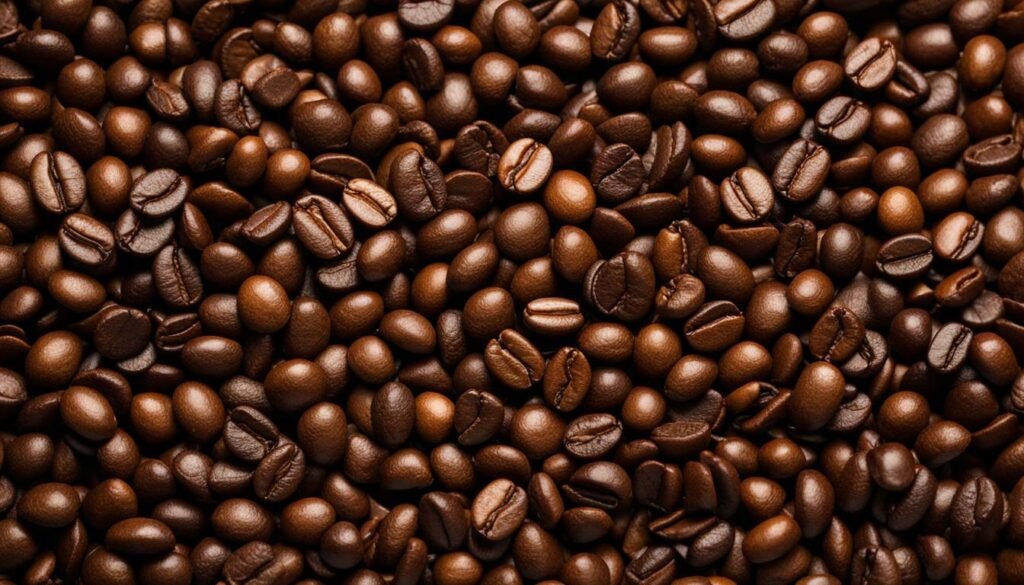
When it comes to coffee storage, temperature plays a crucial role in preserving its flavor and aroma. High temperatures can have a detrimental effect on coffee, causing it to deteriorate and lose its freshness. It is important to store coffee away from sources of heat, such as the oven or stovetop, to protect its quality and extend its shelf life.
The Risks of Exposing Coffee to High Temperatures
Exposing coffee to high temperatures before brewing can speed up the oxidation process, leading to a loss of flavor and aroma. The heat can also cause the coffee beans to release oils prematurely, resulting in a less satisfying cup of coffee. Additionally, high temperatures can increase the likelihood of moisture absorption, which can lead to a stale and damp coffee experience.
To ensure that your coffee stays fresh and flavorful, it is recommended to store it in a cool environment with consistent temperatures. A dark cupboard or pantry away from direct sunlight is an ideal location. By keeping coffee away from heat sources and maintaining a stable temperature, you can enjoy a rich and satisfying cup of coffee every time.
Tips for Temperature-Controlled Coffee Storage
- Store coffee in a cool, dark cupboard or pantry with a temperature range of 50-70°F (10-21°C).
- Avoid placing coffee near heat sources such as the stove, oven, or microwave.
- Do not store coffee in the refrigerator, as the humidity and fluctuating temperatures can compromise its flavor.
- Consider investing in an airtight container or coffee canister to further protect your coffee from environmental factors.
By following these temperature-controlled storage practices, you can ensure that your coffee remains fresh and flavorful for an extended period, allowing you to savor every sip of your favorite brew.
The Effects of Moisture on Coffee
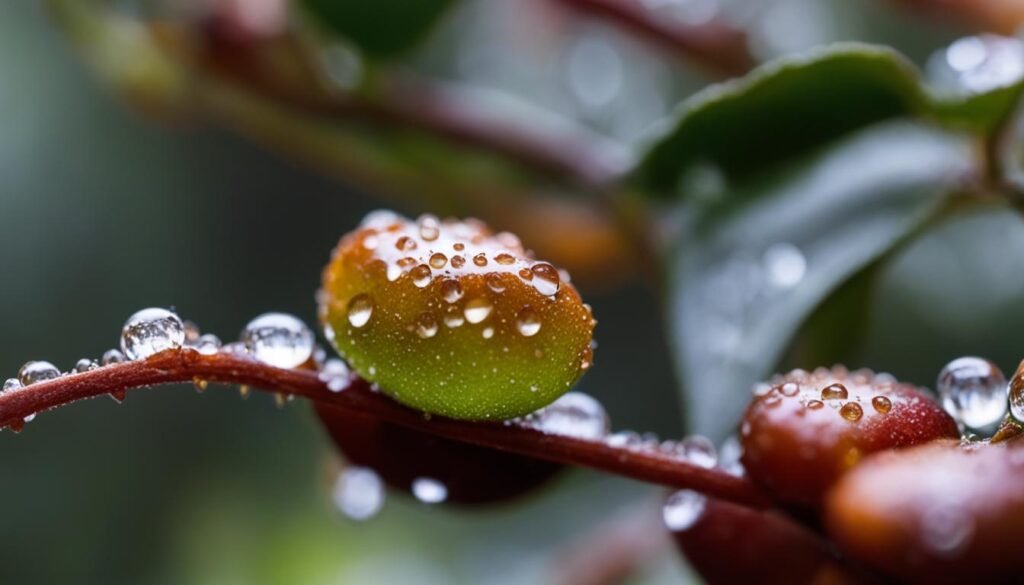
Moisture and humidity play a significant role in coffee storage and preservation. When coffee is exposed to excess moisture, it can lead to changes in its cell structure, resulting in a loss of aroma and flavor. To maintain the quality of your coffee, it is crucial to store it in a dry environment and avoid sudden temperature fluctuations that can increase moisture levels.
Here are some tips to protect your coffee from moisture:
- Use an airtight container: Investing in a high-quality, airtight container is essential for keeping moisture out and preserving the freshness of your coffee.
- Avoid storing coffee in the refrigerator: While it may seem like a logical choice to keep coffee in the refrigerator, the humid environment inside can lead to condensation and the growth of microorganisms.
- Store coffee in a cool, dark place: Find a cool and dry spot in your kitchen, such as a pantry or cupboard, away from the stove or any direct sources of heat.
- Don’t grind coffee in advance: Grinding coffee beans exposes more surface area to moisture, leading to faster degradation. It’s best to grind your coffee just before brewing.
By following these measures, you can ensure that your coffee stays fresh and flavorful, allowing you to enjoy every sip of your favorite brew.
Freezing Coffee: A Trade-Off
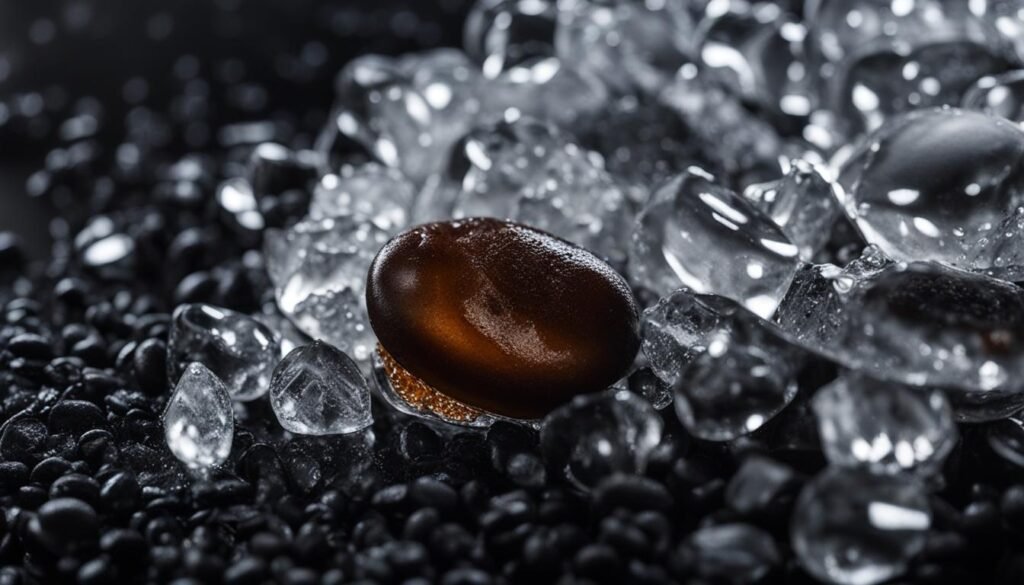
When it comes to extending the shelf life of coffee, freezing is often considered as an option. However, it’s important to understand that freezing coffee comes with a trade-off in terms of quality. Coffee beans are hygroscopic, meaning they can absorb moisture from their surroundings, including the freezer. This can have an impact on the original flavors and aromas of the coffee.
To freeze coffee beans effectively, it is recommended to store them in airtight bags and keep them in the freezer for up to a month. This helps to minimize exposure to air and moisture. When thawing the frozen beans, make sure to do it slowly in a cool, dry place. Rapid temperature changes can cause condensation and affect the overall taste of the coffee.
Benefits of Freezing Coffee:
- Extends the shelf life of coffee
- Allows you to stock up on your favorite blends
- Preserves the freshness of the coffee to some extent
Drawbacks of Freezing Coffee:
- Potential loss of flavor and aroma due to moisture absorption
- Requires careful thawing to avoid condensation
- Frozen coffee may not taste as fresh as freshly roasted beans
While freezing coffee can be a practical solution for preserving its shelf life, it’s important to consider the trade-off in terms of quality. If you decide to freeze coffee, make sure to follow the proper storage and thawing methods to minimize any potential negative effects on taste and aroma.
Conclusion
In conclusion, when it comes to coffee storage, the best way to preserve its freshness and flavor is by avoiding the refrigerator. The humid environment of the fridge can lead to condensation and the growth of microorganisms, compromising the quality of your coffee.
Instead, we recommend storing coffee in a cool, dark cupboard. This will help protect it from oxygen, light, high temperatures, and moisture, all of which can negatively impact its taste and longevity.
To ensure optimal storage, keep your coffee in its original packaging or transfer it to an airtight container. This will help minimize exposure to oxygen and maintain the coffee’s freshness for longer periods.
By following these simple storage recommendations, you can enjoy a cup of delicious, flavorful coffee every time. So remember, keep your coffee away from the fridge and give it the proper care it deserves!
FAQ
Should coffee be kept in the refrigerator?
No, coffee should not be stored in the refrigerator. The humid and light environment of the refrigerator can lead to condensation and the growth of microorganisms, affecting the flavor and quality of the coffee.
What is the best way to store coffee?
Coffee should be stored in an airtight container in a cool, dark cupboard. This helps to minimize exposure to oxygen, light, high temperatures, and moisture, preserving the freshness and flavor of the coffee.
How does oxygen impact coffee?
Oxygen can negatively affect the quality of coffee. It is best to keep coffee sealed in its original packaging or transfer it to an airtight container to minimize exposure to oxygen.
What are the effects of light on coffee?
Light, whether natural or artificial, can break down the molecules in coffee and impact its flavor and shelf life. Coffee should be stored in opaque containers, away from any sources of light, to protect its quality.
How does temperature influence coffee?
High temperatures can accelerate oxidation and degrade the flavor of coffee. It is recommended to store coffee away from hot areas in the kitchen, such as the oven or stovetop, to preserve its quality.
What are the effects of moisture on coffee?
Moisture and humidity can cause coffee to absorb excess moisture, leading to changes in cell structure and loss of aroma and flavor. It is crucial to store coffee in a dry environment and avoid sudden temperature fluctuations that can increase moisture levels.
Can coffee be frozen to extend its shelf life?
Yes, freezing coffee can extend its shelf life, but it may impact the overall quality. Coffee beans are hygroscopic and can absorb moisture from the freezer, affecting their original flavors. It is best to freeze whole coffee beans for up to a month in airtight bags and thaw them before use.
What is the conclusion on coffee storage?
To keep coffee fresh and flavorful, it is recommended to store it in a dark, cool cupboard in its original packaging or an airtight container. This helps to minimize exposure to oxygen, light, high temperatures, and moisture, preserving the quality of the coffee.
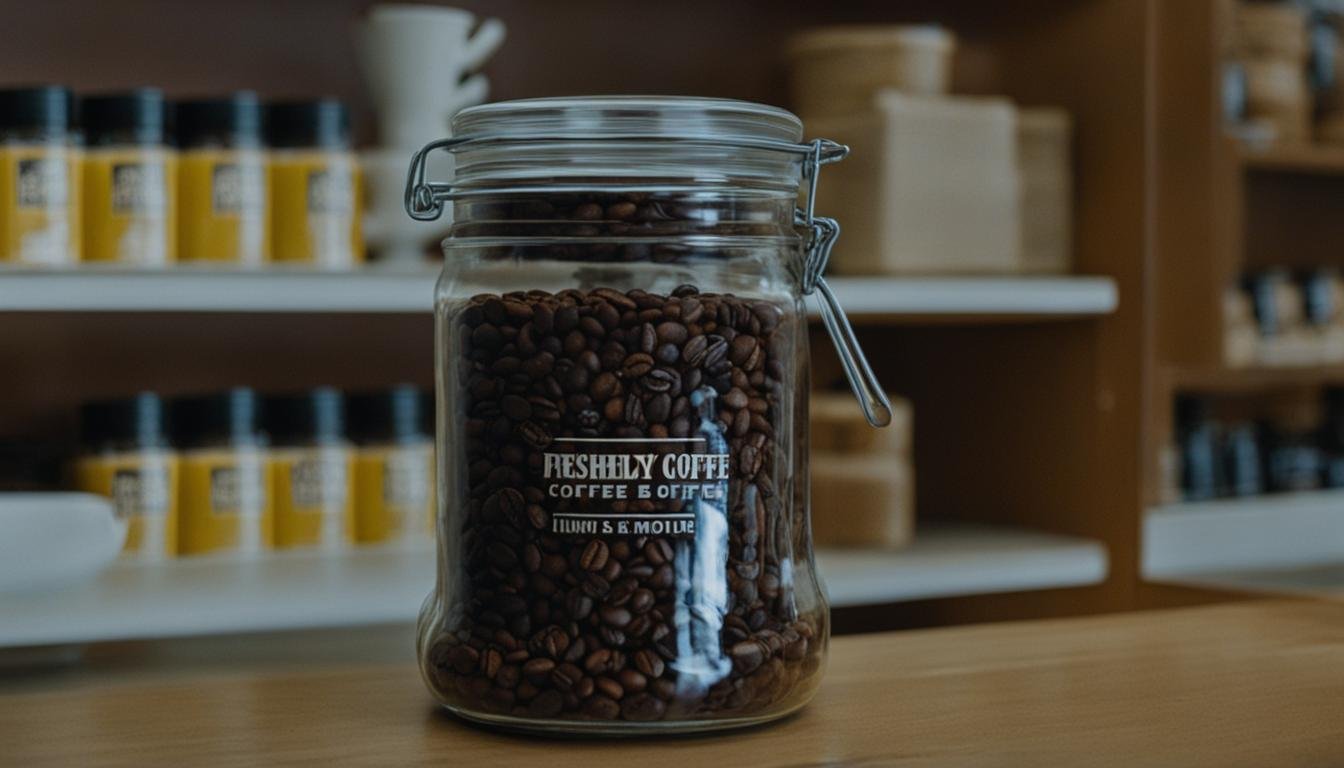
Leave a Reply